Fall 2022
NIDCR News

NIDCR Deputy Director Jennifer Webster-Cyriaque, DDS, PhD, received the 2022 Distinguished Scientist Award in Oral Medicine & Pathology Research from the International Association for Dental Research (IADR). IADR CEO Christopher Fox, DMD, DMS, presented the award to Dr. Webster-Cyriaque at NIH’s Bethesda, Maryland campus; NIH Acting Director Lawrence A. Tabak, DDS, PhD, and NIDCR Director Rena D’Souza, DDS, PhD, were also in attendance. The award honors Dr. Webster-Cyriaque’s track record of outstanding research in oral immunology and mechanisms that govern health and disease in the oral cavity and related tissues.

NIDCR Director Dr. D’Souza penned a guest post for the NIH Director’s Blog to highlight oral health inequities in America. Drawing from the Oral Health in America: Advances and Challenges report, Dr. D’Souza emphasized the importance of achieving oral and overall health for all through efforts that include research to improve access to oral care and delineate the connections among oral health, mental illness, and addiction.
Science Advances
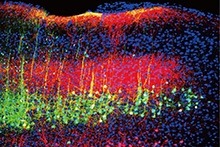
By playing sounds—classical music, unpleasant music, and white noise—at a low intensity, an international team of scientists reduced pain sensitivity in mice and identified the neural mechanisms underlying this effect. The study, co-led by NIDCR Stadtman Tenure Track Investigator Yuanyuan (Kevin) Liu, PhD, and researchers in China, may inform development of non-opioid pain therapies.

Challenging previous notions about inflammation and pain, scientists found that a robust initial inflammatory response during acute pain appears to protect against chronic pain rather than contribute to it. The NIDCR-supported study suggests that suppressing inflammation to lull acute pain may be counterproductive for relieving low back and jaw pain in the long run.
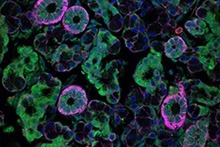
NIDCR scientists Matthew Hoffman, PhD, and John Chiorini, PhD, lent their salivary biology expertise to a National Heart, Lung, and Blood Institute study, which discovered that norovirus and other “stomach viruses” can grow in salivary glands and spread through saliva in mice. The findings point to a possible new transmission route for these viruses, which commonly cause intestinal illness in humans.
Grantee News
New Study Presents the First Data-Driven Model of Cranial Bone Development in Children
Penn Dental Medicine Study Applies Microrobotics in Endodontic Treatment, Diagnostics
Deconstructing the Mechanics of Bone Marrow Disease
Shapeshifting Microrobots Can Brush and Floss Teeth
First US Study Analyzing Tooth Survival After Root Canal in General Population
NIH/HHS News
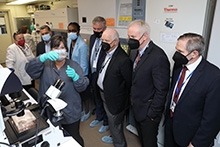
On July 22, HHS secretary Xavier Becerra, JD, toured the National Cancer Institute’s Center for Cancer Research, learning about research efforts related to the Cancer Moonshot initiative, which aims to reduce cancer deaths by 50% over the next 25 years. In June, HHS Assistant Secretary for Health Adm. Rachel Levine, MD, visited campus to deliver opening remarks for an NIH Pride event and met with leadership to discuss ongoing COVID-19 research.
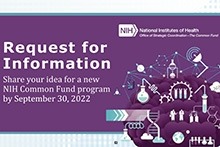
NIH’s Common Fund, which supports bold scientific programs, is seeking new ideas that can catalyze discovery across all biomedical and behavioral research. NIH encourages the public to share what they think is the greatest opportunity in biomedical research and why it should be pursued. The deadline for responses is Friday, September 30, 2022, at 11:59 pm ET.
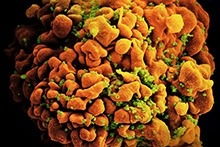
A large clinical trial of people living with HIV showed that treating precancerous anal growths reduces the risk of anal cancer by more than half. Nearly all cases of anal cancer are caused by cancer-causing human papillomaviruses (HPV), which also give rise to cervical and oral cancer. The findings could potentially lead to recommendations for lesion screening in people with HIV and others, including those with HPV-related pre-cancers or cancers.

Anthony S. Fauci, MD, announced his plan to step down from his federal positions in December 2022 to pursue the next chapter of his career. He is currently director of the National Institute of Allergy and Infectious Diseases (NIAID), chief of the NIAID Laboratory of Immunoregulation, and chief medical advisor to President Joe Biden. The president, HHS secretary, and NIH acting director issued statements recognizing Fauci’s long and influential career. Fauci served the public for more than 50 years by researching immune-mediated and infectious disease, advising seven presidents, and steering the nation through public health crises, including the HIV/AIDS epidemic and the COVID-19 pandemic.

On August 10, President Biden announced his intent to name Monica Bertagnolli, MD, as the 16th and first female director of the National Cancer Institute. A surgeon-oncologist, Bertagnolli is currently the Richard E. Wilson professor at Harvard Medical School, a surgeon at Brigham and Women’s Hospital, and a member of the Gastrointestinal and Sarcoma Treatment Centers at Dana-Farber Cancer Institute.

NIH Acting Director Dr. Tabak named Nina F. Schor, MD, PhD, as the NIH acting deputy director for intramural research. Schor joined NIH as the deputy director of the National Institute of Neurological Disorders and Stroke in 2018 and assumed the role of director in 2021. She received her doctorate from Rockefeller University and her MD from Cornell University.

Dr. Tabak appointed Kevin D. Williams, JD, as the director of the NIH Office of Equity, Diversity, and Inclusion. He joins NIH from the U.S. Federal Trade Commission, where he served as deputy executive director, overseeing the management and administration of the agency. Williams earned his bachelor’s degree from Morehouse College and his JD from Howard University School of Law.
| Title | Opportunity number | Extramural Scientific Topics | Release Date | Expiration Date |
|---|---|---|---|---|
|
NOT-DE-22-017 |
|
|
|
|
|
RFA-DE-23-012 |
|
|
|
|
|
RFA-DE-23-015 |
|
|
|
|
|
RFA-DE-23-016 |
|
|
|
|
|
RFA-DE-23-006 |
|
|
|
|
|
RFA-DE-23-007 |
|
|
|
|
|
RFA-DE-23-008 |
|
|
|
|
|
RFA-NS-23-003 |
|
|
|
|
|
RFA-HL-23-017 |
|
|
|
|
|
RFA-HL-23-019 |
|
|
|
|
|
RFA-HL-23-020 |
|
|
|
|
|
RFA-DE-23-009 |
|
|
|
|
|
PA-22-176 |
|
|
|
|
|
PA-22-178 |
|
|
|
|
|
NOT-OD-22-142 |
|
|
|
|
|
NOT-NS-23-002 |
|
|
|
|
|
NOT-DE-22-013 |
|
|
|
|
|
NOT-AT-22-027 |
|
|
|
|
|
NOT-DE-22-014 |
|
|
|
|
|
NOT-NS-22-095 |
|
|
|
|
|
NOT-OD-22-178 |
|
|
|
|
|
NOT-OD-22-179 |
|
|
|
|
|
NOT-OD-22-168 |
|
|
|
|
|
NOT-NR-22-015 |
|
|
|
|
|
NOT-OD-22-167 |
|
|
|
|
|
NOT-AG-22-025 |
|
|
|
|
|
NOT-OD-22-148 |
|
|
|
|
|
NOT-OD-22-149 |
|
|
|
|
|
NOT-OD-22-150 |
|
|
|
|
|
NOT-OD-22-153 |
|
|
|
|
|
NOT-CA-22-092 |
|
|
|
|
|
NOT-OD-22-135 |
|
|
|
|
|
NOT-CA-22-093 |
|
|
|
|
|
NOT-OD-22-154 |
|
|
|
|
|
NOT-OD-22-137 |
|
|
|
|
|
NOT-ES-22-006 |
|
|
|
|
|
NOT-NS-22-087 |
|
|
|
|
|
NOT-OD-22-136 |
|
|
|
